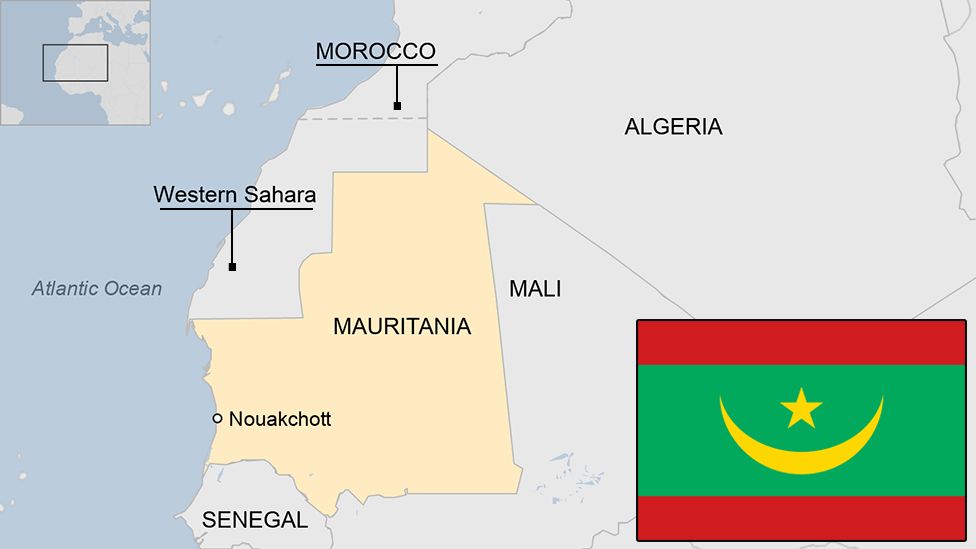Mauritania country profile
- Published

One of Africa's newest oil producers, the Islamic Republic of Mauritania bridges the Arab Maghreb and western sub-Saharan Africa.
The largely-desert country presents a cultural contrast, with an Arab-Berber population to the north and black Africans to the south. Many of its people are nomads.
In the Middle Ages Mauritania was the cradle of the Almoravid movement, which spread Islam throughout the region and for a while controlled the Islamic part of Spain.
European traders began to show interest in Mauritania in the 15th Century. France gained control of the coastal region in 1817, and in 1904 a formal French protectorate was extended over the territory.
Mauritania is rich in mineral resources, especially iron and ore. It is seen by the West as a valuable ally in the fight against Islamist militancy in the Sahel region.
- Read more country profiles - Profiles by BBC Monitoring
ISLAMIC REPUBLIC OF MAURITANIA: FACTS
- Capital: Nouakchott
- Area: 1,030,000 sq km
- Population: 4.6 million
- Languages: Arabic, plus French, Wolof, Pulaar, Soninke, Zenaga
- Life expectancy: 62 years (men) 66 years (women)
LEADER
President: Mohamed Ould Ghazouani
Former defence minister Mohamed Ould Ghazouani won the 2019 presidential election, succeeding his mentor and fellow army officer Mohamed Ould Abdel Aziz.
The election was presented as having been the country's first peaceful transition of power since independence.
Ghazouani's El Insaf party comfortable the May 2023 parliamenatary and local elections, seen by many observers as a litmus test for him ahead of 2024's presidential poll. He is widely expected to seek re-election, although he has not confirmed his plans.
MEDIA
Mauritania has one of the most open media environments of the Maghreb region.
TIMELINE
Some key dates in Mauritania's history:
3rd-7th centuries AD - Berber and Arab migrants arrive in present-day Mauritania.
9th-10th Centuries - Empire of Ghana has its capital in present-day south-west Mauritania.
1076 - Berber Almoravid warriors defeat the Empire of Ghana.
1500s - European mariners and traders establish settlements.
1644-1674 - Char Bouba War. Attempt by local peoples to resist the Beni Ḥassān Bedouin tribes of Yemeni origin who are extending their authority over most of Mauritania and parts of Morocco.
1850s-60s - French forces gain control of southern Mauritania.
1898 - France wins the allegiance of Moors in the region.
1904 - Mauritania becomes part of French West Africa, first as a protectorate and later as a colony.
1912 - French forces defeat the northern emirate of Adrar, and incorporate it into the territory of Mauritania.
1960 - Mauritania becomes independent from France.
1964 - President Moktar Ould Daddah, originally installed by the French, makes Mauritania a one-party state and sets up an authoritarian regime.
1970s - Long-lasting Sahel droughts cause massive devastation and exacerbate problems of poverty and conflict.
1976 - Mauritania, along with Morocco, annexes part of the territory of Western Sahara.
1978 - President Daddah is deposed in a bloodless military coup after significant losses to the Polisario armed independence movement in Western Sahara. The military rule Mauritania for more than 20 years.
1979 - Mauritania gives up its claims to Western Sahara.
1989-91 - Mauritania-Senegal Border War. Hundreds are killed and some 250,000 people become refugees as both countries fight over natural resources and their River Senegal border.
2007 - First fully democratic presidential elections since independence take place.
2014 - France establishes a long-term military operation to prevent jihadist groups from setting up safe havens in the Sahel, including Mauritania.
Related Topics
- Published31 January 2023
- Published20 June 2023
- Published29 August 2023
- Published28 July 2023
- Published2 April